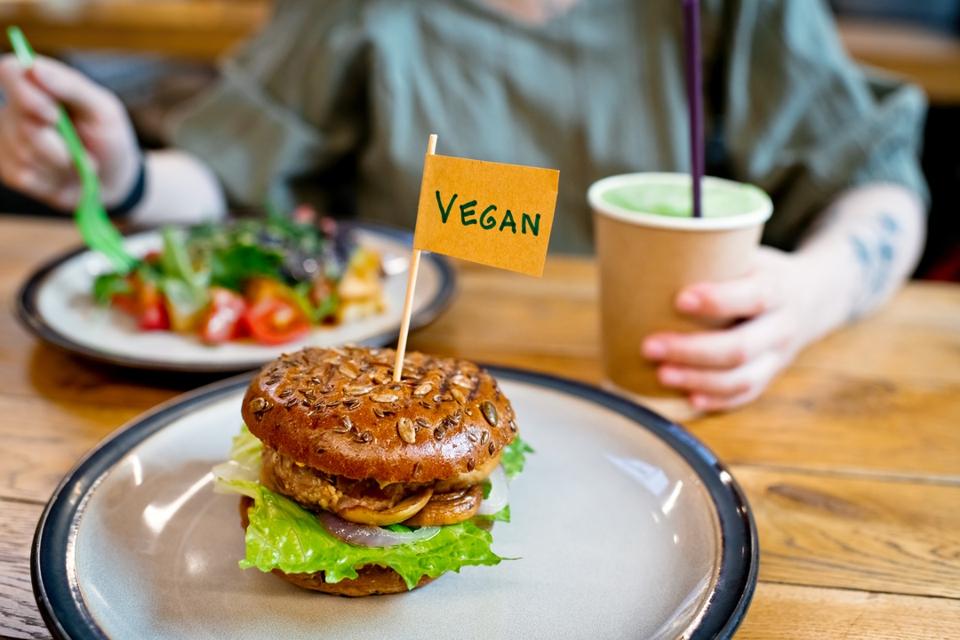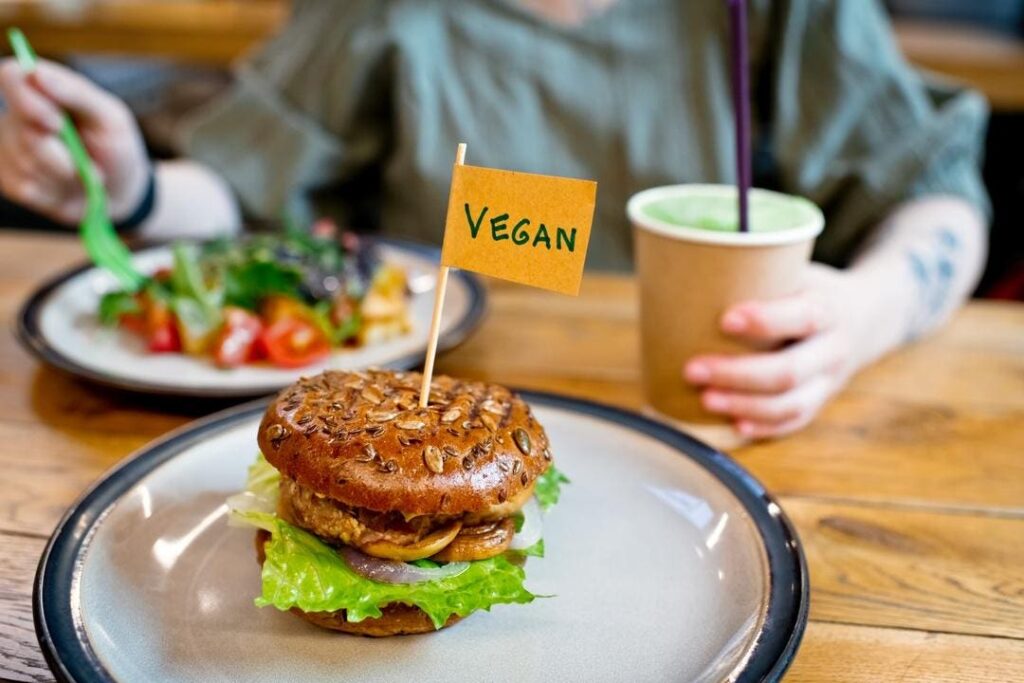No eggs, fish, cheese, milk, honey, or any meat. November is the month when vegans all over the world celebrate their lifestyle, although the dietary regime can be challenging. Can they at least drink wine? Yes. But only if it’s vegan. Here are five good examples to drink now.

Vegan woman in a cafe
gettyAre Vegan Wines Different From The Usual Ones?
Vegan wines are not fundamentally different from others. Both vegan and non‑vegan wines are made in a similar way, except for the fining step: vegan winemakers avoid animal‑derived products for clarification, whereas others may use egg whites, isinglass (from fish bladders), gelatin, or casein. Fining helps make wine clear and transparent, removing small residues from fermentation that can cause the liquid to become turbid. This process can improve appearance, smooth out tannins, reduce bitterness and astringency, and refine aroma. The technique has existed since Roman times, when egg whites and other animal‑based agents were used. Sometimes, however, winemakers choose not to add anything; they simply let time and gravity clarify and clean the liquid by ageing the wine longer. Thus, we can say that vegan wine has always existed, but it was not labeled that way.
Nowadays, all clarifying agents are removed when the wine is clarified, so their origin should be irrelevant. However, for a vegan consumer, the making of a product also matters. Therefore, in vegan wines, producers use plant-based or mineral alternatives such as charcoal, plant-based proteins from peas or potatoes, and silica gel. Some winemakers also employ mechanical filtration methods, and sometimes they skip the fining phase altogether. This decision does not alter the flavor profile of the wine. If you enjoy a wine like Chianti, Barolo, or Prosecco, the vegan version will taste the same. The difference lies in production values, not in sensory experience.
Rise and Growth Of The Vegan Movement in Italy
Veganism arrived in Italy in a marginal way, following the vegetarian movement that started in Europe in the 19th century, and it began to spread more widely in the 1970s. From the 1990s onward, growing attention to sustainability and the appearance of the first vegan products in supermarkets facilitated the transition to this lifestyle. The real boom, though, occurred in the 21st century because of greater availability of vegan food in restaurants and supermarkets, and increased awareness of the environmental and ethical impact of consuming animal products. Italian wine producers, always attentive to market trends and export opportunities, began responding to this new consumer interest. By the mid‑2010s, several forward‑thinking Italian wineries started labeling their wines as vegan and seeking certification from organizations such as ICEA, Qualità Vegetariana® Vegan (a CSQA trademark), VeganOK, Bioagricert, BeVeg, etc. Regions like Tuscany, Piedmont, and Veneto were among the first to embrace vegan certification.
The timing was also perfect for Italy’s natural and organic wine renaissance. Wine producers who had already reduced chemical intervention in their vineyards discovered that vegan practices in the cellar could be a natural extension of their approach to winemaking. Nowadays, minimal chemical intervention in the field, transparency in winemaking, environmental sustainability, and respect for animal welfare are shared values for more and more people, vegan or not.
Why Many Vegan Italian Wines Are Not Labeled As Vegan
To date, there is no official data that attests to the production of Italian vegan wine, and many of them are not labeled as such either. The reasons can be several. Vegan certification is not a requirement in Italy, and there are no rules for labeling those wines. Wine companies have to rely on private entities to certify their bottles, and this comes at a cost. Furthermore, many wineries prefer to focus on communicating other aspects of their production (sustainable, organic, biodynamic, etc.), as the “vegan” label can be perceived as a niche only for a few, rather than for everyone. And to demonstrate that vegan wines can also be enjoyed by wine lovers who don’t follow that strict dietary regime, here are five vegan wines that are worth trying.
“Animante” Franciacorta Extra Brut Franciacorta DOCG Barone Pizzini. This historic wine company founded in the 18th century, has been the first organic winery certified in the Franciacorta denomination, and is now also the first winery entirely vegan certified by the International vegan standard VeganOK. This sparkling wine shows an elegant pale yellow in the glass, with notes of white flowers, acacia honey, brioche, apricot, and hazelnuts. The fine creaminess in the mouth has a savory closure.
2021 “Rugiada del Mattino”, Colli Tortonesi DOC, I Carpini. This white wine is made with the ancient and fascinating autochthonous grape of this part of Piedmont: Timorasso. Intense yellow in the glass, this wine expresses flavors of ripe white and yellow fruits, peaches, apricots, and apples, with hints of mineral. The taste is dry, structured, but well-balanced with the freshness, and a clean finish.
A bottle of the vegan wine Chiaretto di Bardolino – Fasoli Gino winery
Fasoli Gino
2023 “La Corte del Pozzo”, Chiaretto di Bardolino DOC, Fasoli Gino. From one of the first Venetian organic certified wineries, this vegan Chiaretto is made with the famous blend of grapes of Bardolino wines: Corvina, Corvinone, and Molinara. The color is a bright salmon, the nose recalls white flowers and roses, and red citrus fruits’ skin. The structure is light, and the nice fruity freshness of the sip makes this rosé very easy to drink.
A bottle of the vegan Dolcetto di Dogliani – Poderi Luigi Einaudi
Poderi L.Einaudi
2023 “Dogliani DOCG”, Poderi Luigi Einaudi. Luigi Einaudi was the first president of Italy and even the founder of this winery. He was also one of the first producers to be known abroad for the quality of his Dolcetto wine, made with one of the most traditional Piedmont grapes. This wine is a dark ruby red in the glass, with flavors of small red fruits as blackberries and plums, and dark flowers as violets. The taste reminds a juice of dark cherries, again blackberries and plums, long and clean.
2020 “Telos” Amarone della Valpolicella DOCG,Tenuta Sant’Antonio: If you are looking for a full-bodied red wine,the Amarone della Valpolicella is always a fitting choice. This vegan Amarone by the Castagnedi Brothers is made with no sulphites added. Corvina, Rondinella, Croatina, and Oseleta are the grapes of the blend, and the color is ruby red with purple nuances. At the nose, complex aromas of red fruits, spices, licorice, black pepper, and chocolate emerge. On the palate, it is smooth and elegant, with refined tannins and a long, fresh finish. And to be consistent with a vegan choice of meal, you can pair this wine with a risotto with porcini mushrooms, or tagliolini with truffles and a pumpkin quiche with radicchio.


Dining and Cooking